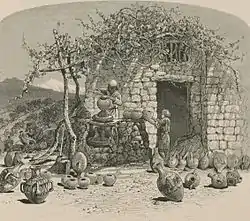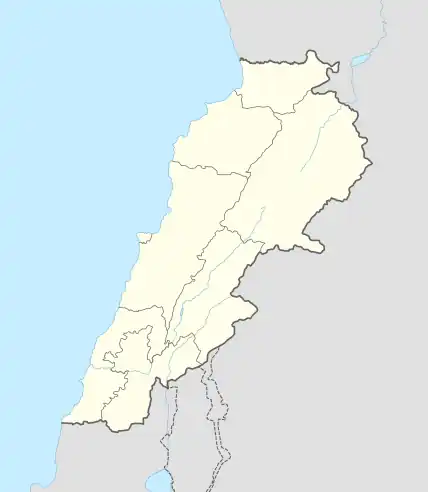Rachaya Al Foukhar
راشيا الفخار | |
|---|---|
City | |
 Rachaya Al Foukhar, in the 1880s:[2] | |
 Rachaya Al Foukhar Location within Lebanon | |
| Coordinates: 33°21′12″N 35°40′02″E / 33.35333°N 35.66722°E | |
| Grid position | 148/157 L |
| Country | |
| Governorate | Nabatieh Governorate |
| District | Hasbaya District |
| Time zone | UTC+2 (EET) |
| • Summer (DST) | UTC+3 (EEST) |
| Dialing code | +961 |
Rachaya Al Foukhar (also spelled Rashaya Al Foukhar, Arabic: راشيا الفخار) is a Lebanese village in the district of Hasbaya in the Nabatiye Governorate in southern Lebanon. It is located on the western slopes of Mount Hermon at an altitude starting at 750 m with the highest summit being at 1,250 m. The population is Greek Orthodox.
History
In 1838, during the Ottoman era, Eli Smith noted the population of Rachaya Al Foukhar as being "Greek" Christians.[3]
In 1852 Edward Robinson noted: "The village is celebrated for its pottery; for the manufacture of which it is one of the chief seats. There are many large dome-shaped furnaces for burning of ware; and many specimens were standing outside of the houses [..], tall jars, and the like. This pottery is sent around to all the fairs of the country, and far into the Hauran; as also to Hums and Hamah."[4]
In 1875, Victor Guérin found here a town with 700 inhabitants, mostly "Schismatic Greek". He also noted the pottery production, and that there was a small Protestant mission in the place.[5]
In 1990, U.S missionary William Robinson was killed here by masked gunmen.[6]
References
- Wilson, ca 1881, vol 2, p 125: "This place, as the name implies, is famous for its potters´s clay. Its furnaces are dome-shaped and capable of burning enormous jars. The potter; mounted on a high seat, sets the wheel in motion with his foot and shapes the clay with his hand. The man beyond is adding handles to the jars."
- ↑ Wilson, ca 1881, vol 2, p 125: "This place, as the name implies, is famous for its potters´s clay. Its furnaces are dome-shaped and capable of burning enormous jars. The potter; mounted on a high seat, sets the wheel in motion with his foot and shapes the clay with his hand. The man beyond is adding handles to the jars."
- ↑ Robinson and Smith, 1841, vol 3, 2nd appendix, p. 138
- ↑ Robinson and Smith, 1856, pp. 415-416
- ↑ Guérin, 1880, pp. 284-5
- ↑ U.S. Missionary Shot to Death At Home in South Lebanon, Ihsan A. Hijazi, March 29, 1990, The New York Times
Bibliography
- Guérin, V. (1880). Description Géographique Historique et Archéologique de la Palestine (in French). Vol. 3: Galilee, pt. 2. Paris: L'Imprimerie Nationale.
- Robinson, E.; Smith, E. (1841). Biblical Researches in Palestine, Mount Sinai and Arabia Petraea: A Journal of Travels in the year 1838. Vol. 3. Boston: Crocker & Brewster.
- Robinson, E.; Smith, E. (1856). Later Biblical Researches in Palestine and adjacent regions: A Journal of Travels in the year 1852. London: John Murray.
- Wilson, C.W., ed. (c. 1881). Picturesque Palestine, Sinai and Egypt. Vol. 2. New York: D. Appleton.
External links
- Rachaiya El Foukhar, Localiban
